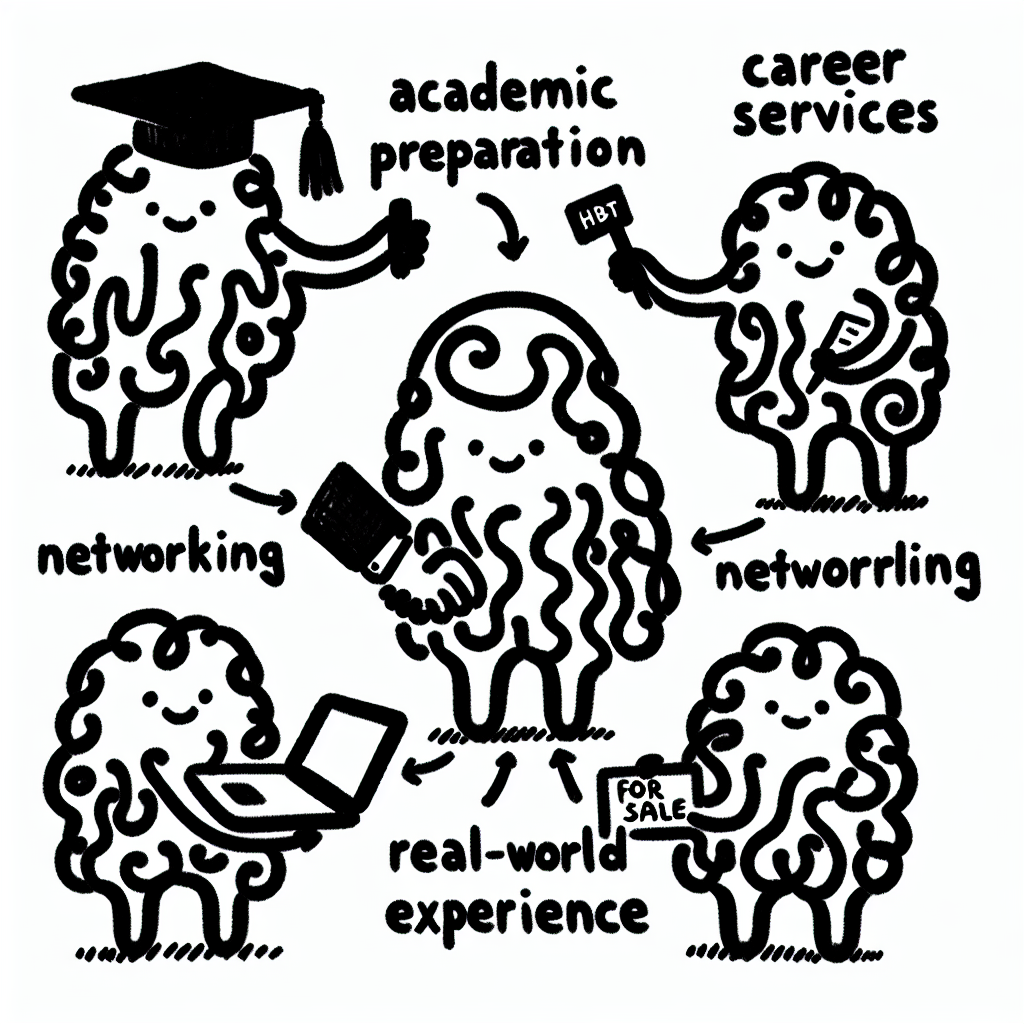Introduction
Getting a job before graduation has become an increasingly important goal for many college students. With rising tuition costs and a competitive job market, securing employment early offers multiple advantages. Students who land a job prior to graduating often benefit from financial stability, which can ease the burden of student debt. Additionally, working while still in school provides real-world experience that complements academic learning and helps build crucial professional skills.
Being employed before graduation also enhances career readiness. Students gain exposure to workplace expectations, time management, and industry-specific knowledge that can set them apart from their peers. This early start can lead to a smoother transition into full-time roles after graduation and a stronger résumé.
Current trends reflect a growing emphasis on early employment. According to a 2023 report by the National Association of Colleges and Employers (NACE), 56% of students who had internships or part-time jobs related to their field of study received full-time job offers before graduation. Employers increasingly value practical experience, making it a key factor in hiring decisions.
As the job market evolves, getting a job before graduation is no longer just beneficial—it’s becoming essential for students who want to stay ahead.

The Value of Higher Education in the Job Market
Higher education plays a key role in increasing the chances of getting a job before graduation. Data from 2023 shows that 80% of individuals aged 25–34 were employed, and employment rates consistently improve with higher levels of education Source.
Earning a bachelor's degree not only lowers the risk of unemployment but also boosts earning potential. In 2023, the unemployment rate was just 3% for those with a bachelor’s degree, compared to 9% for individuals without a high school diploma Source. Similarly, median annual earnings were significantly higher for bachelor’s degree holders at $67,300, while those without a high school diploma earned a median of $35,300 Source.
These statistics underline how higher education increases both job security and income, making it an essential factor for students aiming at getting a job before graduation.

Employment While in College
Working during college is a common step toward getting a job before graduation. According to the National Center for Education Statistics, in 2020, 38% of full-time undergraduates were employed, while 74% of part-time undergraduates held jobs Source.
Holding a job while in school offers several benefits for students pursuing employment before graduation. It helps build both soft and technical skills that are valuable in the workplace. Employment can also expand a student’s professional network, which may lead to future job opportunities. Financial independence is another advantage, as earning income can reduce reliance on loans or family support. Additionally, balancing work and academics can enhance a student’s time management and sense of responsibility—skills that are critical in full-time roles after college.
However, there are challenges to consider. Balancing job responsibilities with coursework can be difficult and may impact academic performance. Students working long hours may have less time to study or participate in extracurricular activities. Additionally, those with paid jobs may have limited access to internships and unpaid opportunities, which can sometimes provide more targeted experience related to their career goals. Despite these challenges, employment during college remains a strategic approach to getting a job before graduation.

Transitioning from Student to Professional
Making the shift from student life to professional employment is a critical phase in any graduate’s journey. Getting a job before graduation can significantly ease this transition by providing early exposure to the workforce and reducing the uncertainty that often accompanies the post-graduation period.
According to data from the National Center for Education Statistics, 74% of graduates from the 2015–16 academic year were employed full-time within four years of graduation, while 7% were employed part-time (Source). These figures highlight the importance of early employment in establishing long-term career stability.
Securing a job before graduation can jump-start career progression by allowing students to build professional skills and networks ahead of their peers. It also reduces the stress of job searching after completing a degree, enabling a smoother and more confident entry into the workforce. Furthermore, early employment demonstrates initiative and ambition—qualities that are highly valued by employers looking for motivated candidates.
Ultimately, getting a job before graduation not only supports a more seamless transition from student to professional but also sets the stage for long-term career success.

Strategies for Securing a Job Before Graduation
Academic Preparation
A strong academic foundation is essential when it comes to getting a job before graduation. Choosing a marketable major aligned with in-demand industries increases your chances of employment. For example, fields like computer science, nursing, and data analytics often have higher job placement rates. Engaging in relevant coursework and hands-on projects showcases your practical knowledge and initiative to potential employers. Maintaining a strong GPA is also critical, as many organizations use GPA as a screening tool during the hiring process.
Leveraging Career Services
University career services offer valuable resources to help students prepare for the job market. Resume and cover letter workshops can help tailor application materials to specific roles. Mock interviews and one-on-one career counseling sessions can build confidence and improve interview techniques. On-campus recruiting events and career fairs provide direct access to employers actively seeking to hire students before graduation.
Building Experience Through:
Gaining real-world experience is often a deciding factor in early job offers. Internships—both paid and unpaid—allow students to apply academic knowledge in professional settings. Co-op programs offer longer-term work placements that can lead to full-time offers. Part-time jobs related to your field of study build relevant skills, while volunteer work and leadership roles on campus demonstrate initiative and a strong work ethic.
Networking and Mentorship
Establishing a professional network is crucial for getting a job before graduation. Building relationships with professors, alumni, and industry professionals can lead to job leads and references. Attending networking events and career panels helps students stay informed about industry trends and hiring practices. Platforms like LinkedIn offer opportunities to connect with recruiters, join professional groups, and showcase your achievements.
Using Online Job Portals and Tools
Online resources expand access to job opportunities. University job boards often feature exclusive listings for students. National job search engines like Handshake and Indeed enable students to search for internships and entry-level positions. Social media and professional networking sites can also be used to follow companies, engage with recruiters, and stay updated on job openings.

Industries and Roles Where Early Hiring is Common
Getting a job before graduation is more achievable in certain industries where early hiring is a well-established practice. These sectors often have structured recruitment processes that target students months in advance of graduation, offering internships and full-time roles ahead of degree completion.
Fields with Structured Campus Recruitment
Several industries are known for formal campus recruitment programs that prioritize early identification of talent:
- Finance and Consulting: Many investment banks, consulting firms, and financial services companies conduct on-campus interviews during the junior year or early in the senior year. These roles often include summer internships that convert into full-time offers before students graduate.
- Engineering and Technology: Tech giants and engineering firms frequently offer co-op programs and internships that lead to early job offers. Companies like Google, Microsoft, and Lockheed Martin often recruit well in advance of graduation through career fairs and direct university partnerships.
- Accounting and Auditing: The Big Four accounting firms—Deloitte, PwC, EY, and KPMG—are known for hiring interns and entry-level staff through structured recruitment cycles that begin during undergraduate study. Offers are commonly extended months before graduation, contingent on completing degree requirements.
Sectors with High Demand for Entry-Level Talent
Other sectors may not have as rigid recruitment cycles but still offer strong opportunities for getting a job before graduation due to ongoing demand:
- Healthcare: Roles such as nursing, medical technologists, and allied health positions are often filled through early hiring because of persistent staffing shortages. Some hospital systems offer job placement to students nearing completion of clinical hours.
- Education: School districts frequently recruit future teachers in advance, particularly in high-need subject areas like math, science, and special education. Many education majors receive job offers before graduation, especially after successful student teaching placements.
- Logistics and Supply Chain: With the rise of e-commerce, companies in logistics and supply chain management are aggressively hiring entry-level talent. Employers often work with universities to identify potential hires through internships and job fairs before students officially graduate.
These industries provide consistent pathways for students interested in getting a job before graduation by offering clear, early-entry recruitment practices.

Employer Perspectives: What They Look for in Students
When it comes to getting a job before graduation, understanding what employers are looking for can give students a distinct advantage. Employers consistently seek candidates who possess a blend of soft and technical skills, as well as a proactive approach to career development.
Skills in Demand
Employers prioritize soft skills such as communication, collaboration, and critical thinking. These abilities help students contribute effectively to team projects, adapt to new challenges, and solve problems independently. In addition, technical skills relevant to the specific role are essential. For example, coding proficiency may be crucial for software development roles, while data analysis skills might be necessary for positions in marketing or finance.
How Students Can Stand Out
Students can improve their chances of getting a job before graduation by showcasing relevant work experience, even if it’s part-time or through internships. This demonstrates practical knowledge and a commitment to learning outside the classroom.
Demonstrated leadership and initiative also set candidates apart. Leading a student organization, launching a project, or volunteering in a meaningful way shows an ability to take charge and drive results.
Finally, having a strong digital presence and a well-curated online portfolio can help students stand out. A LinkedIn profile that highlights achievements, or a personal website that showcases projects and skills, gives employers an accessible way to evaluate a candidate’s potential.

Realities and Expectations Post-Graduation
Job Search Timelines
When it comes to getting a job before graduation, timing can vary widely by industry. Fields like finance, consulting, and technology often begin recruiting in the fall of senior year, sometimes even earlier. In contrast, industries such as education, non-profits, and healthcare may not start hiring until closer to graduation or after students have completed their degrees. Understanding your industry’s timeline is crucial for aligning your job search efforts appropriately.
Salary Expectations
Students aiming at getting a job before graduation should also have realistic expectations about starting salaries. While a college degree generally leads to higher earning potential, the actual salary can vary based on major, location, and experience. According to the National Center for Education Statistics, individuals with higher levels of education tend to earn more on average over their lifetimes than those without a degree (Source).
Continued Learning and Certifications
Getting a job before graduation doesn't mean learning stops. Many industries value continuous upskilling through short courses, workshops, or on-the-job training. In some fields, obtaining additional certifications or pursuing graduate education can significantly enhance job prospects and salary potential. For example, certifications in project management, data analysis, or specific software tools can make candidates more competitive in a crowded job market.

Policy and Institutional Support
Role of Colleges and Universities
Colleges and universities play a key role in helping students with getting a job before graduation by embedding career readiness into their academic programs. This includes incorporating real-world skills like communication, teamwork, and problem-solving into coursework across disciplines. Some institutions have also developed required career development courses or modules to ensure students are prepared for the workforce.
Another major area of support is the expansion of internship programs. By partnering with local businesses and organizations, schools can offer students more opportunities to gain practical experience. Many universities are also working to ensure these internships are accessible to students from all backgrounds by providing academic credit or stipends for unpaid positions.
Federal and State Initiatives
Government policy contributes significantly to helping students with getting a job before graduation. Federal work-study programs allow eligible students to gain relevant job experience while earning money for their education. These programs are often connected to students' fields of study, providing both income and career preparation.
In addition, both federal and state governments fund career development services at higher education institutions. This funding supports career counseling, job fairs, resume workshops, and employer networking events—all of which are designed to improve students’ employment outcomes before graduation.

Conclusion
Getting a job before graduation offers a range of benefits that can positively impact both your short-term and long-term career path. By starting early, students gain practical experience, build professional networks, and improve their time management skills. These advantages not only make graduates more competitive in the job market but also help clarify career goals before entering full-time employment.
Being proactive in your job search—whether through internships, part-time roles, or campus opportunities—can significantly increase your chances of securing meaningful employment before graduation. Taking initiative early allows you to explore different industries, develop relevant skills, and reduce the stress of post-graduation uncertainty.
Ultimately, early employment provides a strong foundation for long-term career success. Employers often value candidates who show motivation and practical experience, and students who work before graduation often transition more smoothly into the workforce. Making the effort to gain employment during college can lead to better job offers, higher starting salaries, and a clearer sense of direction after graduation.

References
- NCES: Employment Rates by Educational Attainment – Provides data on how educational achievement affects employment, a crucial factor when considering the benefits of getting a job before graduation.
- NCES: College Student Employment – Offers insights into how many college students work while attending school, helping to understand trends related to getting a job before graduation.
- NCES: Employment Outcomes of Bachelor's Degree Holders – Details employment outcomes for graduates, which supports the value of gaining work experience by getting a job before graduation.
- NCES: Annual Earnings by Educational Attainment – Shows salary differences based on education levels, relevant for evaluating long-term benefits of getting a job before graduation.
- NCES: Unemployment Rates by Educational Attainment – Highlights how unemployment rates vary with education, reinforcing the importance of gaining early work experience through getting a job before graduation.







.png)






